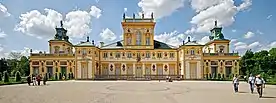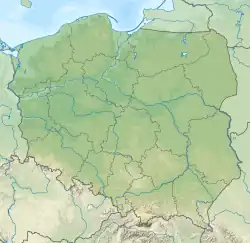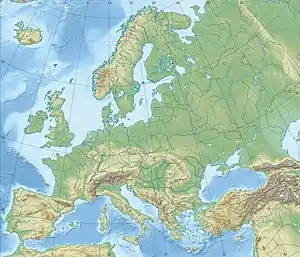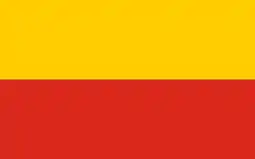Warsaw
Warsaw (In Polish: Warszawa) is the capital of Poland in Masovian Voivodeship. It is also the biggest city in that country. There are about 2,000,000 people living there (1,726,581 as of 31 March 2014). People from Warsaw are called "Varsovians".
Warsaw
Warszawa | |
|---|---|
Capital city and county | |
.jpg.webp)  .jpg.webp)     
| |
 Coat of arms | |
| Nickname(s): Paris of the North, Phoenix City | |
| Motto: Semper invicta (Latin "Ever invincible") | |
 Warsaw Location within Poland  Warsaw Location within Europe | |
| Coordinates: 52°14′N 21°1′E | |
| Country | Poland |
| Voivodeship | Masovia |
| County | City county |
| Founded | 13th century |
| City rights | 1323 |
| Districts | 18 boroughs |
| Government | |
| • Mayor | Rafał Trzaskowski (PO) |
| Area | |
| • Capital city and county | 517.24 km2 (199.71 sq mi) |
| • Metro | 6,100.43 km2 (2,355.39 sq mi) |
| Elevation | 78–116 m (328 ft) |
| Population (30 June 2020) | |
| • Capital city and county | 1,793,579 (1st) |
| • Rank | 1st in Poland (8th in EU) |
| • Density | 3,460/km2 (9,000/sq mi) |
| • Metro | 3,100,844[2] |
| • Metro density | 509.1/km2 (1,319/sq mi) |
| Demonym | Varsovian |
| Time zone | UTC+1 (CET) |
| • Summer (DST) | UTC+2 (CEST) |
| Postal code | 00-001 to 04–999 |
| Area code | +48 22 |
| Website | um.warszawa.pl |
| Official name | Historic Centre of Warsaw |
| Type | Cultural |
| Criteria | ii, vi |
| Designated | 1980 (4th session) |
| Reference no. | |
| UNESCO region | Europe |
There are other names for Warsaw. For example, Varsovia (Latin, Spanish) and Varsóvia (Portuguese), Varsovie (French), Varsavia (Italian), Warschau (German, Dutch), װאַרשע /Varshe (Yiddish), Varšuva (Lithuanian), Varsó (Hungarian) and Varšava (Czech)
Geography
Warsaw is near the middle of Poland on both sides of the Vistula river, and about 350 km (225 miles) from the Baltic Sea. It is about 100 m (325 ft) above sea level. Warsaw has a humid continental climate (Dfb in the Koeppen climate classification).
Warsaw is home to four universities and 62 colleges, and many theatres and art galleries.
History
People began living here in the 13th century. By the 15th century, Warsaw had grown enough to be called a city. It became the capital of Poland in 1596.
The city was destroyed several times in its history, but every time it was rebuilt. The most important of these times was during the Second World War. Poland had been occupied by Germany between 1939 and 1944. On 1 August 1944, the people of Warsaw started fighting to free their city.
Tourist attractions
There are lot of attractions in the capital of Poland. The most famous monument of Warsaw is the Palace of Culture and Science. There is a palace in Wilanów. The king of Poland John III Sobieski lived there. Many people like going to the Museum of Warsaw Uprising. The uprising started in 1944 during World War II
Pictures of Warsaw
 Royal Castle
Royal Castle.jpg.webp) Presidential Palace
Presidential Palace Old Town
Old Town Branicki Palace
Branicki Palace.jpg.webp) Jablonski Palace
Jablonski Palace Łazienki Palace
Łazienki Palace Łazienki Palace
Łazienki Palace Belweder
Belweder Chopin
Chopin Ujazdów Palace
Ujazdów Palace Wilanów
Wilanów Aleksander's Church
Aleksander's Church Seminar Church
Seminar Church Saxon Garden 1900
Saxon Garden 1900 Filharmonia
Filharmonia Politechnic
Politechnic
References
- "Local Data Bank". Statistics Poland. Retrieved 1 June 2019. Data for territorial unit 1465000.
- "Data services - Eurostat".
Other websites
- Official web page of Warsaw Archived 2007-11-16 at the Wayback Machine
- Official tourist web page of Warsaw Archived 2005-08-12 at the Wayback Machine
- Interactive city map Archived 2011-01-28 at the Wayback Machine
- Modern architecture in Warsaw Archived 2014-05-01 at the Wayback Machine
- Historic images of Warsaw
